
Hickory is a common name for trees composing the genus Carya, which includes around 18 species. Five or six species are native to China, Indochina, and India (Assam), as many as twelve are native to the United States, four are found in Mexico, and two to four are native to Canada. A number of hickory species are used for their edible nuts, lumber or other wood and woodcraft products.

Amorpha juglandis, the walnut sphinx, is the only species in the monotypic moth genus Amorpha, which is in the family Sphingidae, erected by Jacob Hübner in 1809. The species was first described by James Edward Smith in 1797.

Catocala retecta, the yellow-gray underwing, is a moth of the family Erebidae. The species was first described by Augustus Radcliffe Grote in 1872. It can be found in North America from southern Ontario and Quebec south through Maine and New Jersey, south through Tennessee to Georgia and west to Arkansas and Kansas and north to Wisconsin. There is one recognised subspecies, Catocala retecta luctuosa, which is sometimes treated as a valid species with the common name yellow-fringed underwing.
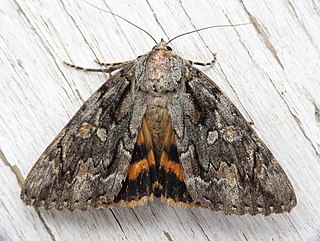
Catocala neogama, the bride, is a moth in the family Erebidae first described by James Edward Smith in 1797. It is found in North America east of the Rocky Mountains, from Maine and Quebec south to northern Florida and west to South Dakota, New Mexico, and into Arizona and Texas. Its westernmost population from the semiarid Colorado Plateau region is rather distinct and was once considered a separate species, but is now regarded as a well-marked subspecies C. n. euphemia.
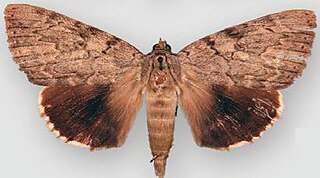
Catocala agrippina, the Agrippina underwing, is a moth of the family Erebidae. The species was first described by Herman Strecker in 1874. It is found in the United States from southern New Jersey south to Florida, west to Texas and eastern Oklahoma and north to southern Indiana.

Catocala angusi, commonly known as Angus' underwing, is a species of moth in the family Erebidae. It is found from Massachusetts and Connecticut south to Georgia west to Arkansas and Kansas and north to Illinois and Michigan.
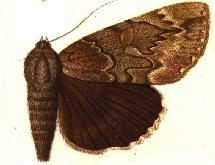
Catocala residua, the residua underwing, is a moth of the family Erebidae. The species was first described by Augustus Radcliffe Grote in 1874. It is found in North America from southern Ontario, Quebec and Maine south to North Carolina and Georgia west to Mississippi and Missouri and north to Iowa, Illinois and Michigan.
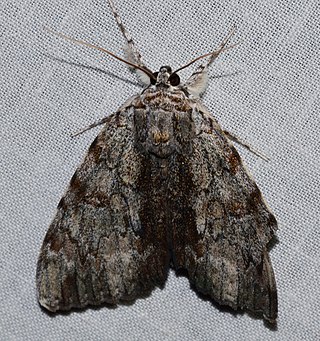
Catocala insolabilis, the inconsolable underwing, is a moth of the family Erebidae. The species was first described by Achille Guenée in 1852. It is found in North America from Ontario through Maine and Connecticut south to Florida, west through Arkansas to Texas and Oklahoma and north to South Dakota.

Catocala judith, or Judith's underwing, is a moth of the family Erebidae. The species was first described by Strecker in 1874. It is found in North America from southern Quebec and Ontario to the United States from New Hampshire south through Connecticut and New Jersey to North Carolina and Georgia, west to Oklahoma and Iowa and north to Wisconsin.

Catocala obscura, the obscure underwing, is a moth of the family Erebidae. The species was first described by Ferdinand Heinrich Hermann Strecker in 1873. In Canada it is found in southern Quebec and Ontario and in the United States it is found from Massachusetts and Connecticut south to North Carolina, west to Mississippi and north to Iowa, Illinois, Ohio, and Michigan.

Catocala consors, the consort underwing, is a moth of the family Erebidae. It is found from Maine and Connecticut south to Florida and west to Texas and eastern Oklahoma.

Catocala maestosa, commonly known as the sad underwing, is a species of moth in the family Erebidae. The species was first described by George Duryea Hulst in 1884. It is found in the United States from New York south to Florida and Alabama, west to Texas and eastern Oklahoma and north to Illinois, Indiana and Minnesota.

Catocala palaeogama, the old wife underwing, is a moth of the family Erebidae. The species was first described by Achille Guenée in 1852. It is found in North America from Ontario and Quebec, through Maine, New Jersey, Tennessee, to South Carolina, west to Arkansas and Oklahoma and north through Iowa, Indiana, Illinois and Michigan.
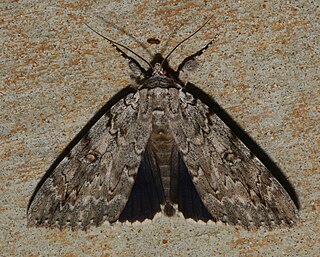
Catocala robinsonii, or Robinson's underwing, is a moth of the family Erebidae. The species was first described by Augustus Radcliffe Grote in 1872. It is found in North America from southern Ontario and New Hampshire south to Florida west to Oklahoma, Missouri and Arkansas and northward to Illinois, Indiana, and Michigan.
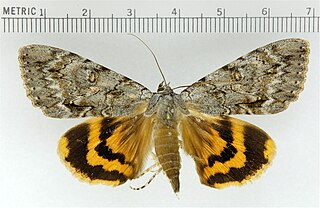
Catocala habilis, the habilis underwing, is a moth of the family Erebidae. The species was first described by Augustus Radcliffe Grote in 1872. It is found in North America from Quebec, Ontario, Manitoba, and New Brunswick south through Connecticut and New Jersey to North Carolina and west to Arkansas.

Catocala nebulosa, the clouded underwing, is a moth of the family Erebidae. The species was first described by William Henry Edwards in 1864. It is found in North America from southern Ontario south through Tennessee to Florida, west to Texas and eastern Oklahoma and north to Iowa, Michigan, Wisconsin and Minnesota.

Catocala serena, the serene underwing, is a moth of the family Erebidae. It is found from southern Ontario, New York, New Jersey, Connecticut, as far south as to at least Tennessee, and west to Pennsylvania, Illinois and at least as far west as eastern Wisconsin.

Catocala subnata, the youthful underwing, is a moth of the family Erebidae. The species was first described by Augustus Radcliffe Grote in 1864. It is found in North America from Manitoba, Ontario, Quebec, and New Brunswick to Nova Scotia, south through Maine and Connecticut to North Carolina and west to Tennessee, Kentucky, and Texas, then north to Iowa, Wisconsin, and Michigan.

Catocala similis, the similar underwing, is a moth of the family Erebidae. The species was first described by William Henry Edwards in 1864. It is found in North America from Ontario and Quebec south through Maine and Connecticut to Florida, west to Texas and Oklahoma, and north to Minnesota.
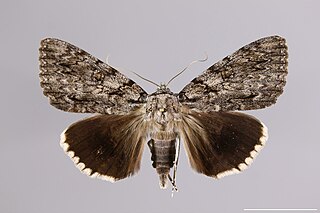
Catocala ulalume, the Ulalume underwing, is a moth of the family Erebidae. The species was first described by Herman Strecker in 1878. It is found in the United States from Virginia through Georgia to Florida, west to Texas and Oklahoma and north to Illinois.

















